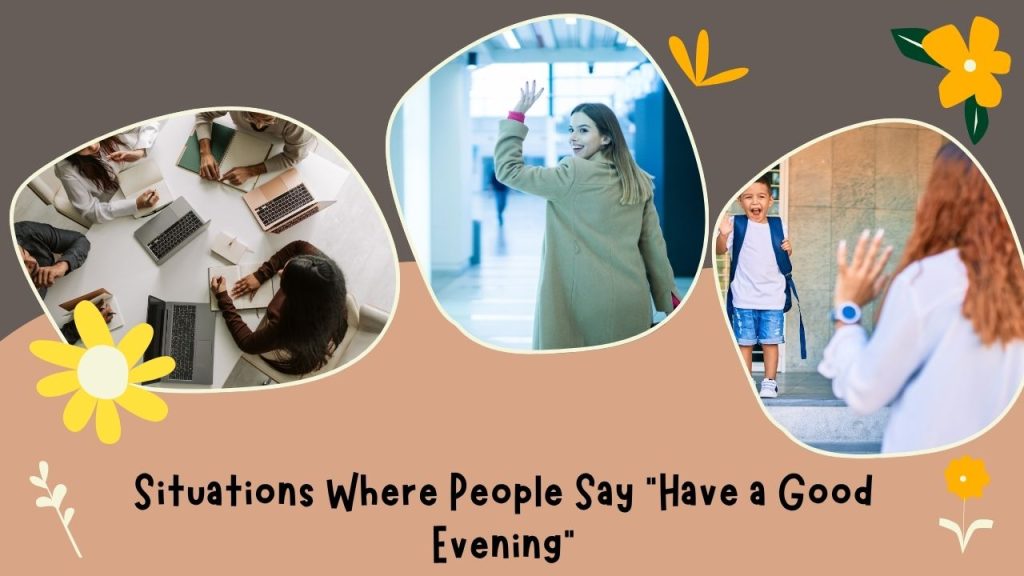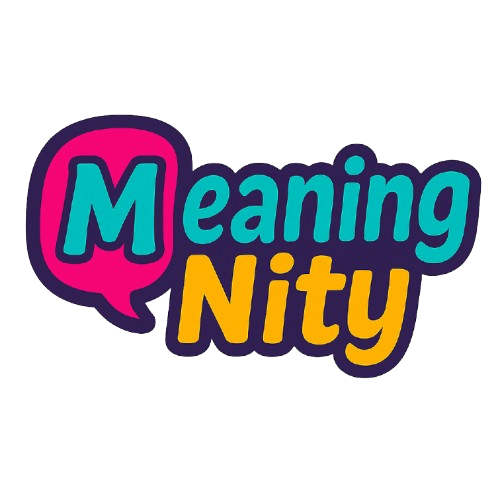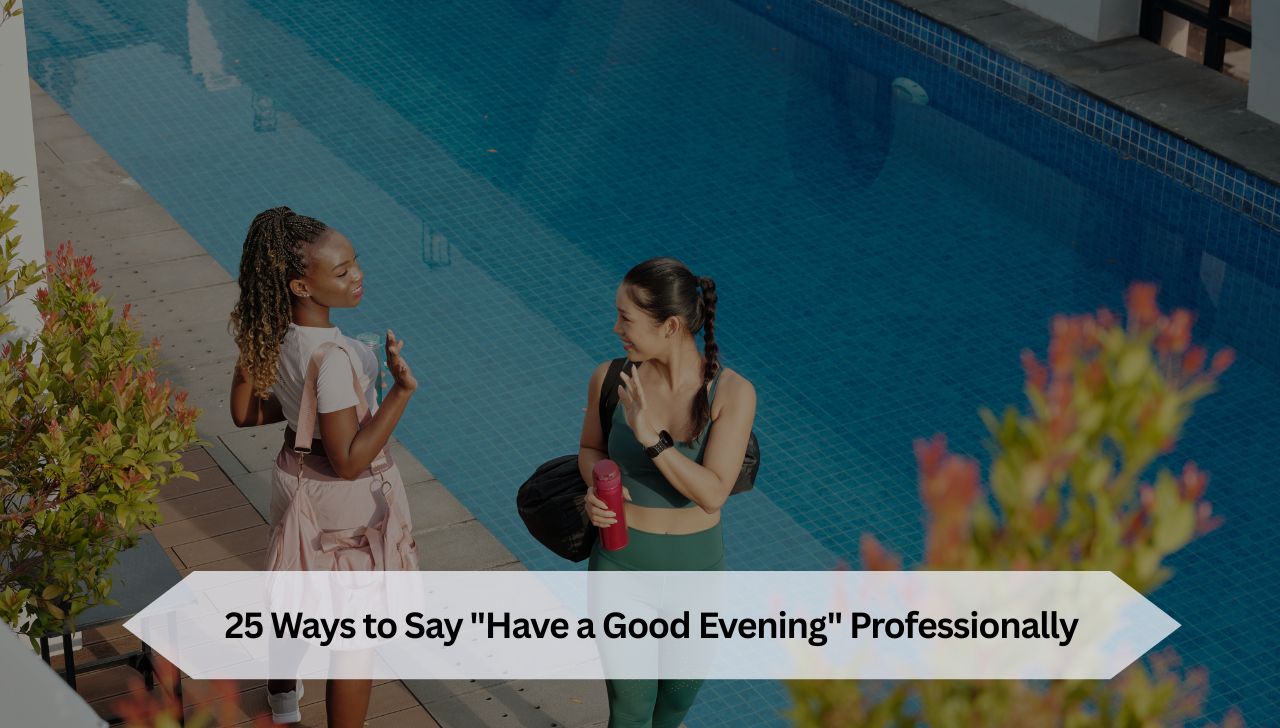25 Ways to Say “Have a Good Evening” Professionally
Ending a workday on a kind note can leave a lasting impression. Whether you’re closing an email, wrapping up a client call, or leaving the office, a warm farewell matters. “Have a good evening” is polite, but it can feel overused. A touch of variety can make your message stand out.
What Does “Have a Good Evening” Actually Mean?
At its core, it’s a polite send-off. It tells someone you wish them peace, rest, or success after working hours. It’s simple, but tone and phrasing matter. In professional settings, small phrases carry weight.

Situations Where People Say “Have a Good Evening”
- At the end of emails sent late in the day
- When wrapping up meetings close to closing hours
- In service industries after assisting clients
- During customer support interactions
- Between colleagues as they leave work
A slight change in how you say it can match the situation better and feel more personal.
Dive Deeper : Requester vs. Requestor: Which Spelling Should You Use?

Below 25 Ways to Say “Have a Good Evening” .
1. “Wishing you a restful evening.”
Example: “Thanks again for your time today. Wishing you a restful evening.”
Best Use Case: After long meetings or late workdays.
2. “Enjoy the rest of your evening.”
Example: “Let’s follow up tomorrow. Enjoy the rest of your evening.”
Best Use Case: Email closings or short calls.
3. “Hope your evening goes smoothly.”
Example: “With those final tasks ahead, hope your evening goes smoothly.”
Best Use Case: When the recipient still has a few things to wrap up.
4. “Have a peaceful evening.”
Example: “Everything’s in order for now. Have a peaceful evening.”
Best Use Case: Ideal for calming conversations or end-of-day reports.
5. “Wishing you a pleasant evening ahead.”
Example: “All documents are signed and ready. Wishing you a pleasant evening ahead.”
Best Use Case: Formal business exchanges.
6. “May your evening be rewarding.”
Example: “Thanks for your efforts today. May your evening be rewarding.”
Best Use Case: After a challenging project or task.
7. “Have a wonderful evening.”
Example: “Looking forward to our next discussion. Have a wonderful evening.”
Best Use Case: General, polite sign-off.
8. “Enjoy your time this evening.”
Example: “We’ve covered everything. Enjoy your time this evening.”
Best Use Case: Casual, but still professional contexts.
9. “Take care and have a good night.”
Example: “Let me know if anything changes. Take care and have a good night.”
Best Use Case: Client-facing or support roles.
10. “Wishing you a relaxing end to your day.”
Example: “That wraps up our tasks. Wishing you a relaxing end to your day.”
Best Use Case: Wrapping up detailed work.
11. “Hope your evening brings you some rest.”
Example: “Great job today. Hope your evening brings you some rest.”
Best Use Case: After heavy workloads or long hours.
12. “Have a calm and pleasant evening.”
Example: “I appreciate your input. Have a calm and pleasant evening.”
Best Use Case: When ending tough discussions on a softer note.
13. “Here’s to a quiet, restful evening.”
Example: “We’ll pick this up tomorrow. Here’s to a quiet, restful evening.”
Best Use Case: For familiar colleagues or informal settings.
14. “May your evening be just what you need.”
Example: “You’ve done enough for today. May your evening be just what you need.”
Best Use Case: When encouraging someone to recharge.
15. “Have a fulfilling evening ahead.”
Example: “Your progress today was great. Have a fulfilling evening ahead.”
Best Use Case: After notable accomplishments.
16. “Hope your evening is kind to you.”
Example: “Let’s circle back in the morning. Hope your evening is kind to you.”
Best Use Case: Shows empathy and sincerity.
17. “Hope tonight gives you a well-earned break.”
Example: “Nice work wrapping that up. Hope tonight gives you a well-earned break.”
Best Use Case: After major deadlines or stressful events.
18. “Have a lovely rest of your evening.”
Example: “Thanks for the update. Have a lovely rest of your evening.”
Best Use Case: General-purpose closing line.
19. “Wishing you some quiet time this evening.”
Example: “Now that the rush is over, wishing you some quiet time this evening.”
Best Use Case: After busy or chaotic workdays.
20. “Have a good night ahead.”
Example: “Let’s finalize things tomorrow. Have a good night ahead.”
Best Use Case: Emails or calls ending after 6 PM.
21. “All the best for the evening.”
Example: “I’ll take it from here. All the best for the evening.”
Best Use Case: Handing over a task or signing off.
22. “Wishing you comfort and calm this evening.”
Example: “You’ve earned a break. Wishing you comfort and calm this evening.”
Best Use Case: Compassionate contexts.
23. “Have a pleasant night ahead.”
Example: “We’re all set. Have a pleasant night ahead.”
Best Use Case: For formal settings.
24. “May the rest of your day go well.”
Example: “Thanks again. May the rest of your day go well.”
Best Use Case: When it’s early evening or there’s work left.
25. “Until tomorrow, have a peaceful evening.”
Example: “I’ll follow up in the morning. Until tomorrow, have a peaceful evening.”
Best Use Case: Friendly, but still professional closings.
Dive Deeper : Cancelation vs Cancellation: Understanding the Key Difference
Conclusion
Small phrases can shape how we connect at work. A thoughtful closing remark helps build rapport and shows care. When you switch up your usual “Have a good evening,” you can match tone, timing, and the person you’re speaking to. So next time you’re sending that 5:45 PM email or walking out of a late meeting—try one of these. A little variation goes a long way.

